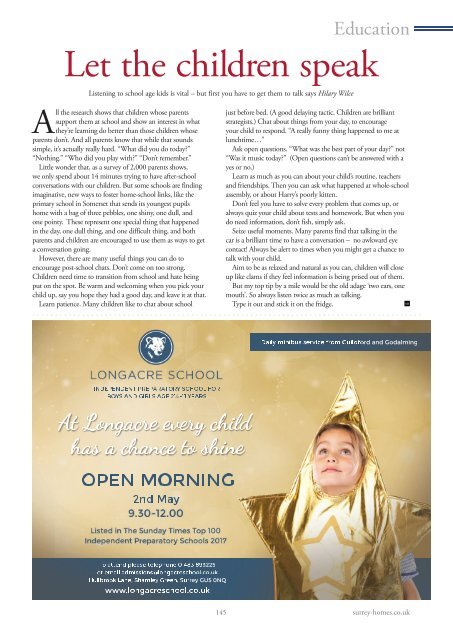Surrey Homes | SH42 | April 2018 | Garden supplement inside
The lifestyle magazine for Surrey - Inspirational Interiors, Fabulous Fashion, Delicious Dishes
The lifestyle magazine for Surrey - Inspirational Interiors, Fabulous Fashion, Delicious Dishes
Create successful ePaper yourself
Turn your PDF publications into a flip-book with our unique Google optimized e-Paper software.
Education<br />
Let the children speak<br />
Listening to school age kids is vital – but first you have to get them to talk says Hilary Wilce<br />
All the research shows that children whose parents<br />
support them at school and show an interest in what<br />
they’re learning do better than those children whose<br />
parents don’t. And all parents know that while that sounds<br />
simple, it’s actually really hard. “What did you do today?”<br />
“Nothing.” “Who did you play with?” “Don’t remember.”<br />
Little wonder that, as a survey of 2,000 parents shows,<br />
we only spend about 14 minutes trying to have after-school<br />
conversations with our children. But some schools are finding<br />
imaginative, new ways to foster home-school links, like the<br />
primary school in Somerset that sends its youngest pupils<br />
home with a bag of three pebbles, one shiny, one dull, and<br />
one pointy. These represent one special thing that happened<br />
in the day, one dull thing, and one difficult thing, and both<br />
parents and children are encouraged to use them as ways to get<br />
a conversation going.<br />
However, there are many useful things you can do to<br />
encourage post-school chats. Don’t come on too strong.<br />
Children need time to transition from school and hate being<br />
put on the spot. Be warm and welcoming when you pick your<br />
child up, say you hope they had a good day, and leave it at that.<br />
Learn patience. Many children like to chat about school<br />
just before bed. (A good delaying tactic. Children are brilliant<br />
strategists.) Chat about things from your day, to encourage<br />
your child to respond. “A really funny thing happened to me at<br />
lunchtime…”<br />
Ask open questions. “What was the best part of your day?” not<br />
“Was it music today?” (Open questions can’t be answered with a<br />
yes or no.)<br />
Learn as much as you can about your child’s routine, teachers<br />
and friendships. Then you can ask what happened at whole-school<br />
assembly, or about Harry’s poorly kitten.<br />
Don’t feel you have to solve every problem that comes up, or<br />
always quiz your child about tests and homework. But when you<br />
do need information, don’t fish, simply ask.<br />
Seize useful moments. Many parents find that talking in the<br />
car is a brilliant time to have a conversation – no awkward eye<br />
contact! Always be alert to times when you might get a chance to<br />
talk with your child.<br />
Aim to be as relaxed and natural as you can, children will close<br />
up like clams if they feel information is being prised out of them.<br />
But my top tip by a mile would be the old adage ‘two ears, one<br />
mouth’. So always listen twice as much as talking.<br />
Type it out and stick it on the fridge.<br />
145 surrey-homes.co.uk<br />
LongacreSchoolS42.indd 1 16/03/<strong>2018</strong> 12:38


















